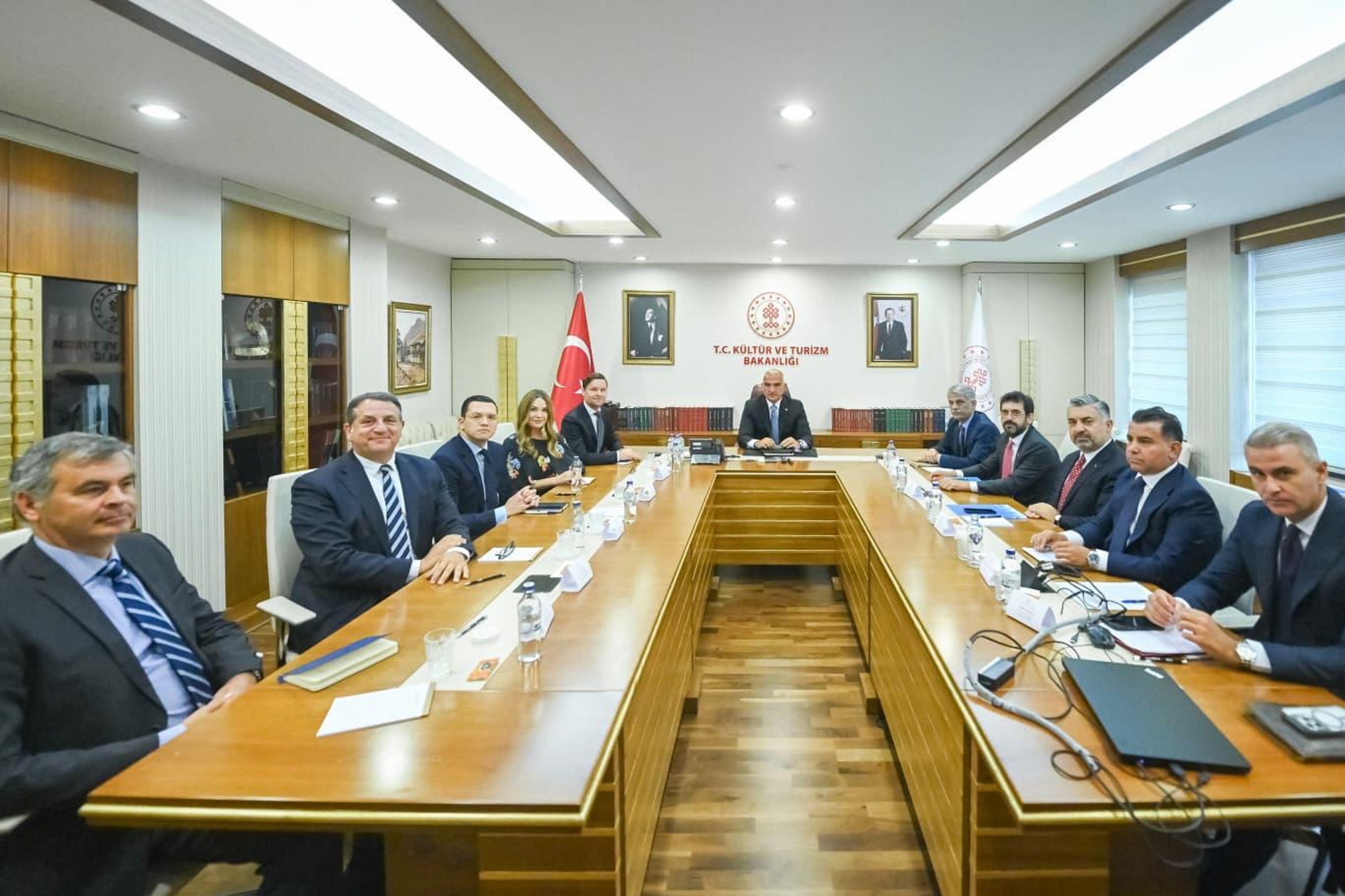Economy
Türkiye’s housing market sees lowest price increase in year
Türkiye’s housing market recorded its weakest monthly price increase in a year in July, according to data on Monday that signaled a continued slowdown in real terms despite nominal gains.
The Residential Property Price Index (RPPI) rose by 0.9% compared to June, the Central Bank of the Republic of Türkiye (CBRT) said. This marks the lowest monthly increase since July last year.
The index, which measures quality-adjusted price changes of dwellings, recorded an annual increase of 32.8% in nominal terms, yet inflation-adjusted figures revealed a 0.5% decline.
The data marked the 18th consecutive month of decline in prices in real terms.
Türkiye’s largest and most populous city, Istanbul, saw a modest monthly increase of 0.6%, while the capital Ankara posted a stronger 1.2% rise. In contrast, the country’s third largest city, Izmir, experienced a 1% monthly decline.
Year-over-year, Ankara led the three major cities with a 42.9% nominal increase, followed by Istanbul at 33.5% and Izmir at 31.0%.
The lowest annual increase was observed in Antalya, Burdur and Isparta region with 19.6%.
The data came days after the country’s statistical authority said the market recorded its strongest month of the year in July, as demand remains strong despite high borrowing costs.
House sales grew 12.4% year-over-year last month to 142,858 units, marking the second-highest July figure ever.
The figure extended the upward trend that began a year ago and signaled the resilience of the housing market despite tight monetary conditions and inflationary pressures.
Monthly sales had ranged between 107,000 and 130,000 units in the first half of the year. Last month’s performance was second only to the pandemic-driven boom in July 2020, when a low-interest loan campaign pushed sales to a record 229,357 units.
The data showed mortgaged sales leaped 60.3% on an annual basis in July and accounted for 14.9% of the total figure. New home sales climbed 7.8% year-over-year, while secondhand sales jumped 14.6%.
Last month, the central bank cut its key policy rate by 300 basis points to 43% as it relaunched an easing cycle that was disrupted by political turmoil earlier this year, as markets calmed and disinflation continued.
The bank had hiked the one-week repo rate to 46% from 42.5% in April and lifted its overnight lending rates to 49 % following market volatility over the arrest in March of Istanbul Mayor Ekrem Imamoğlu.
Imamoğlu was jailed pending trial over graft charges.
Before April, the CBRT had gradually cut its key policy rate from December as inflation eased.
Latest official data showed inflation slowed to 33.5% in July, the lowest rate since November 2021, having peaked at 75% in May last year.
From January through July, overall sales reached 834,751 units, the second-highest seven-month total ever and a 24.2% increase from a year ago.
The peak was recorded in 2020 when 854,126 units were sold in the first seven months.
Mortgaged sales almost doubled during this January-July period, rising 93.2%.
Industry representatives say this year’s sales are expected to surpass 1.5 million units, highlighting persistent demand fueled by high rents and the fact that housing price increases currently remain below inflation.
In the whole of 2024, sales grew by 20.6% to about 1.48 million units, returning to levels last seen in 2022.
Economy
US adds over 400 product categories to steel, aluminum tariffs list
The United States on Tuesday said it was hiking steel and aluminum tariffs on more than 400 products including wind turbines, mobile cranes, appliances, bulldozers and other heavy equipment, along with railcars, motorcycles, marine engines, furniture and hundreds of other products.
The Commerce Department said 407 product categories are being added to the list of “derivative” steel and aluminum products covered by sectoral tariffs, with a 50% tariff on any steel and aluminum content of these products plus the country rate on the non-steel and non-aluminum content.
Evercore ISI said in a research note the move covers more than 400 product codes representing over $200 billion in imports last year and estimates it will raise the overall effective tariff rate by around 1 percentage point.
The Commerce Department is also adding imported parts for automotive exhaust systems and electrical steel needed for electric vehicles to the new tariffs as well as components for buses, air conditioners as well as appliances including refrigerators, freezers and dryers.
A group of foreign automakers had urged the department not to add the parts, saying the U.S. does not have the domestic capacity to handle current demand.
Tesla unsuccessfully asked Commerce Department to reject a request to add steel products used in electric vehicle motors and wind turbines, saying there was no available U.S. capacity to produce steel for use in the drive unit of EVs.
The new tariffs take effect immediately and also cover compressors and pumps and the metal in imported cosmetics and other personal care packaging like aerosol cans.
“Today’s action expands the reach of the steel and aluminum tariffs and shuts down avenues for circumvention – supporting the continued revitalization of the American steel and aluminum industries,” said Under Secretary of Commerce for Industry and Security Jeffrey Kessler.
Steelmakers including Cleveland Cliffs, Nucor and others had petitioned the administration to expand the tariffs to include additional steel and aluminum auto parts.
Since returning to the presidency, President Donald Trump has imposed a 10% tariff on almost all U.S. trading partners, alongside varying steeper levels on dozens of economies such as the European Union and Japan.
Certain sectors have been spared from these countrywide tariff levels but instead were targeted under different authorities by even higher duties.
In the case of steel and aluminum, Trump initially unveiled a 25% tariff on imports of both metals before doubling this to 50% in June.
Though the impact of Trump’s tariffs on consumer prices has been limited so far, economists warn that their full effects are yet to be seen.
For now, some businesses have coped by bringing forward purchases of products they expected will encounter tariffs. Others have passed on additional costs to their consumers, or absorbed a part of the fresh tariff burden.
But analysts note that importers and retailers will unlikely be able to eat these costs indefinitely, and could eventually raise more consumer prices.
Some economists argue that the inflation hit will be one-off, but others are wary of more persistent effects.
The latest Commerce Department additions came after a window for the public to submit product inclusion requests.
Economy
Spotify to open Türkiye office amid chart scrutiny, artist complaints
Spotify will establish a local office in Türkiye in 2026, Culture and Tourism Minister Mehmet Nuri Ersoy announced on Tuesday, a development that follows a formal investigation and mounting criticism from artists over the company’s chart compilation practices.
The office will address “an important deficiency” and strengthen collaboration between the music streaming giant and Turkish artists, Ersoy said on social media platform X.
The announcement came after Ersoy met with Spotify representatives in Ankara. He said concrete progress would soon be made to ensure Türkiye’s music ecosystem receives the support it deserves from Spotify.
The company has faced backlash from Turkish artists over what they describe as a lack of transparency in how its charts are compiled. Spotify has also been accused of censorship and preferential treatment.
Reports had also suggested Spotify launched an internal investigation into its editors in Türkiye following allegations of bribery linked to local charts, though the company later denied this.
Last month, the Turkish Competition Authority (RK) launched an investigation into “various allegations that the strategies and policies implemented by Spotify” in Türkiye have caused anti-competitive effects in the music industry.
The regulator said the probe would examine whether the Swedish company gave more visibility to some artists and engaged in unfair practices in the distribution of royalties, thereby violating competition law.

The company said its operations complied with “all applicable laws” but would cooperate with the investigation.
“Spotify will establish its office in Istanbul in 2026, deepening collaborations in this field,” said Ersoy. “We will sit down with company representatives and our music industry stakeholders to explore joint initiatives.”
The minister noted that Turkish artists achieved global success in 2024, reaching 2.8 billion new listeners and breaking records on international charts.
“Today, more than half of royalty revenues come from audiences outside Türkiye. This strong partnership will also support young talents and female artists, giving new momentum to our cultural diplomacy,” he added.
“We will continue working closely with the Spotify team on this and similar efforts to promote Türkiye’s rich musical heritage and culture worldwide.”
Spotify, which launched in Türkiye in 2013, says it paid over TL 2 billion (nearly $50 million) to the local music industry in 2024, calling its service “pivotal in growing Turkish artists’ royalties globally.”
Economy
Türkiye’s untapped $3.5T mining potential seen as key to narrowing trade gap
The mining sector carries strategic importance and could be seen as key to narrowing the trade deficit of Türkiye, which is yet to fully utilize its massive underground potential, according to industry representatives.
Türkiye recorded a foreign trade gap of $49.3 billion (TL 2.02 trillion) in the first half of the year, of which $20.8 billion stemmed from the mining and quarrying industry, according to data from the Turkish Miners Association (TMD).
“Türkiye’s underground potential is worth $3.5 trillion. It is unacceptable to run an annual trade deficit of $50 billion-$60 billion while leaving this potential untapped,” TMD President Mehmet Yılmaz said.
Although exploration licenses cover 7.7 million hectares across the country’s 78.3 million-hectare land area, actual operating licenses represent just one-thousandth of that total. On average, only one in every 200 exploration permits becomes an active mine.
Mining activity in forest areas accounts for only 0.1% of Türkiye’s total surface area, with rehabilitation and reforestation mandated by law. So far, around 11,325 hectares have been rehabilitated.
Yılmaz says mining should be a “locomotive sector” for Türkiye’s economy, citing developed countries such as the United States, Canada, Australia, Russia, China and India, where he says mining has historically played a central role in industrial development.
“Considering our underground potential, activating the mining sector is an inevitable and highly significant reality,” he noted.
Gold, boron, marble
Yılmaz underlined Türkiye’s global significance in several key resources, including gold, boron and marble.
The country holds 73% of the world’s boron reserves, though value-added production remains limited.
Exporting refined boron products to industries such as glass, fertilizer, batteries and defense could generate an additional $2 billion annually, said Yılmaz.
In marble, he said boosting sales of processed products rather than raw exports could add $1.5 billion in revenue.
“We are the world leader in boron. And we have branded products in the marble sector,” he added.
Türkiye’s gold reserves are estimated at about 5,000 tons, but could rise toward 10,000 tons with updated surveys, according to Yılmaz.
Critical role in green transition
Yılmaz also pointed to the role of critical minerals in the global energy transition.
“Lithium, graphite and rare earth elements are vital for producing electric vehicles, wind turbines and solar panels. The shift to green energy will require six to nine times more mining. We must mobilize this potential,” he said.
He noted that Türkiye has “strategic” reserves of lithium, silver, titanium, iron, manganese, zinc, copper and aluminum, which are resources crucial for defense, renewable energy and high-tech industries.
Emphasizing the rising demand for minerals driven by clean energy technologies, Yılmaz said: “An electric vehicle requires six times more minerals than a conventional car, while an offshore wind turbine uses 13 times more minerals compared to a natural gas power plant.”
He added that Türkiye’s target of adding 60 gigawatts of renewable energy capacity by 2035 will significantly increase demand for mining inputs.
Yılmaz emphasized that industrial dependence on foreign sources is “unacceptable.”
“Positioning mining against the environment and local communities is wrong. Any mining activity that prioritizes people and the environment within a framework of sustainability should be supported,” he said.
Addressing debates over mining in olive groves, Yılmaz said activities could proceed if international criteria and safeguards are met. “Olive trees are sacred, but just like industrial plants, housing projects, or highways can cause damage, mining too can be managed in a way that balances national interest,” he added.
He also highlighted misconceptions about mining in forest areas, noting that only 0.038% of forest land is used for mining. “Preventing the misuse of such misperceptions is in the nation’s best interest,” he said.
Economy
Türkiye says to surpass $390B in goods, services trade by year-end
Türkiye is on track to achieve a new peak and exceed $390 billion (TL 15.95 trillion) in total foreign trade in goods and services this year, Trade Minister Ömer Bolat said on Tuesday.
That would mark a major upgrade from $375 billion in 2024 and compares to only $50 billion more than two decades ago, Bolat told an event in Istanbul.
Since the beginning of the year, Türkiye has added $1 billion to its exports every month, said the minister, adding that outbound shipments rose by 5.1% in the first seven months of this year.
“In 2002, Türkiye had $50 billion in exports. Today, we’ve reached $375 billion, and by year-end, we’ll surpass $390 billion,” Bolat noted.
He underlined the growing role of textiles and apparel, noting that in 2024 the sector generated $32.1 billion in exports.
Of this, $19.7 billion came from ready-to-wear and apparel, $9.4 billion from textiles and raw materials and $2.9 billion from carpets.
Together, these industries secured a 3.5% share of global exports, ranking Türkiye seventh worldwide and the European Union’s fourth-largest supplier, Bolat said.
Overall, Bolat cited the national income that reached $1.3 trillion last year and noted the economy’s continuous growth despite global challenges.
The government aims to lift the per capita income to $16,500-$17,000, the minister added. The income reached over $15,460 last year, according to official data.
“We will overcome challenges. As inflation declines, growth will accelerate in a stable environment.”
He predicted easing inflation in the period ahead would support financing conditions.
Inflation slowed to 33.5% in July, according to official data, the lowest rate since November 2021, having peaked at 75% in May last year.
Bolat said inflation has been declining for the past 14 months and said it would drop below 30% by the end of the year.
This, he said, along with declining interest rates, will make financing more accessible and support stronger export performance.
“With inflation falling into the 20s in 2026, access to financing will be easier and market stability will be firmly established,” he noted.
As disinflation continues, the Turkish central bank last month relaunched an easing cycle that was disrupted by political turmoil earlier this year, cutting its key policy rate by 300 basis points to 43%.
The bank had hiked the one-week repo rate to 46% from 42.5% in April and lifted its overnight lending rates to 49 % following market volatility over the arrest in March of Istanbul Mayor Ekrem Imamoğlu.
Imamoğlu was jailed pending trial over graft charges.
Before April, the bank had gradually cut its key policy rate from December as inflation eased.
“If global demand improves and the Russia-Ukraine war ends with a peace deal, we will see much brighter days for our economy,” said Bolat.
The minister highlighted government support for exporters, saying 60% of the ministry’s budget is allocated to incentives, including market access, trade fairs and sectoral trade delegations.
Economy
Türkiye says to hold 5G tender in October, eyes 2026 rollout
Türkiye plans to finalize the specifications for its long-awaited 5G frequency tender by the end of this month and hold the auction in October, with initial service expected to be available in 2026, Transport and Infrastructure Minister Abdulkadir Uraloğlu said Tuesday.
Uraloğlu’s remarks came days after the government published the list of frequencies to be allocated for usage rights in the 5G tender, with the minimum price for the available frequency packages set at $2.13 billion.
“We aim to publish the tender specifications this month and hold the tender in October. Our goal is to expand 5G across the entire country within a few years after the initial signal is received in 2026,” Uraloğlu said in a statement.
He noted that the ministry had held extensive consultations and examined international practices, particularly in Europe, to design the auction framework.
“We are preparing the tender specifications in a way that both serves the public interest and does not hinder operators’ investment capabilities or reflexes,” he said.
According to a presidential decree published in the Official Gazette on Saturday, the tender will include 11 frequency packages across the 700 MHz and 3.5 GHz bands, with individual package values ranging from $50 million to $425 million.
All three operators – government-controlled Türk Telekom and Turkcell along with Vodafone’s Turkish unit – are expected to take part in the tender.
The tender will also see the government roll over existing mobile network licenses, which are currently set to expire in 2029. Operators will be required to pay 5% of their yearly revenues to roll over the licenses.
The operators have long been preparing for the transition.
Last week, Türk Telekom said it is fully prepared for the 5G tender and rollout, citing its robust fiber infrastructure and strategic investments.
Its CEO Ümit Önal said 54% of the company’s long-term evolution (LTE) base stations are already connected via fiber.
Türk Telekom owns and maintains nearly 80% of Türkiye’s national fiber network through a concession agreement that is set to expire in 2026. Önal said the company is nearing the renewal of the deal.
Turkcell CEO Ali Taha Koç said the company has completed financial planning for the rollout. “A large part of our network has been modernized for the transition to 5G and the fiberization rate of our base stations has been rapidly increasing,” he said.
“We have also finalized our financial planning to integrate new base stations into our network,” he added.
Economy
Brits get limited relief as grocery inflation edges lower in August
Grocery inflation in Britain nudged down to 5.0% over the four weeks to Aug. 10, data from market researcher Worldpanel by Numerator showed on Tuesday, providing limited relief for consumers.
The figure, the most up-to-date snapshot of U.K. food inflation, compares to 5.2% in last month’s report. Official U.K. inflation data for July will be published on Wednesday.
Britain’s food retailers have said that increased employer taxes and regulatory costs as well as higher staff wages have added to the inflationary pressure of rising prices on many commodity markets.
“We’ve seen a marginal drop in grocery price inflation this month, but we’re still well past the point at which price rises really start to bite and consumers are continuing to adapt their behavior to make ends meet,” Fraser McKevitt, head of retail and consumer insight at Worldpanel, said.
He noted consumer trips during the three months to mid-July to casual and fast service restaurants were 6% lower than a year ago. But as consumers made savings outside the home, they sought treats in store.
Sales of branded grocery items were up 6.1% over the four weeks, while sales of own-label alternatives were up 4.1%. Among the fastest price rises were for chocolate, fresh meat and coffee and the fastest falls were in champagne and sparkling wine, dog food and sugar confectionery, Worldpanel said.
Trade body the British Retail Consortium, which represents Britain’s biggest retailers, has predicted food inflation will hit 6% by the end of the year, putting more pressure on household budgets in the run-up to Christmas.
The Bank of England (BoE) has forecast it will hit 5.5% before Christmas and then recede as it anticipates falls on commodity markets. Worldpanel said U.K. grocery sales grew 4.0% over the four-week period year-over-year, indicating sales volumes were down after inflation was taken into account.
Discounter Lidl and online supermarket Ocado were Britain’s fastest growing grocers over the 12 weeks to Aug. 10, with sales up 10.7%. Sales at industry leader Tesco rose 7.4%, with its market share up 0.8 percentage points over the year to 28.4%. However, number three player Asda struggled with sales down 2.6% and a 0.9 percentage points loss of market share year-over-year.
-

 Politics3 days ago
Politics3 days agoTürkiye slams Israel’s W. Bank plan as threat to peace, 2-state solution
-

 Sports3 days ago
Sports3 days agoMarquez extends MotoGP championship lead with 1st Austrian GP win
-

 Sports3 days ago
Sports3 days agoChimaev warns rivals with dominating UFC title win over du Plessis
-

 Sports2 days ago
Sports2 days agoPSG win to open Ligue 1 campaign, Espanyol stun Atleti in La Liga
-

 Politics3 days ago
Politics3 days ago‘Terror-free Türkiye aims to build shared future with entire society’
-

 Daily Agenda3 days ago
Daily Agenda3 days agoFrom President Erdoğan, the greeting phone for the daughter of Ömer Halisdemir, the martyr of July 15
-

 Economy2 days ago
Economy2 days agoTürkiye moves to final stage before 5G rollout
-

 Politics3 days ago
Politics3 days agoBeyoğlu district mayor arrested in corruption probe




